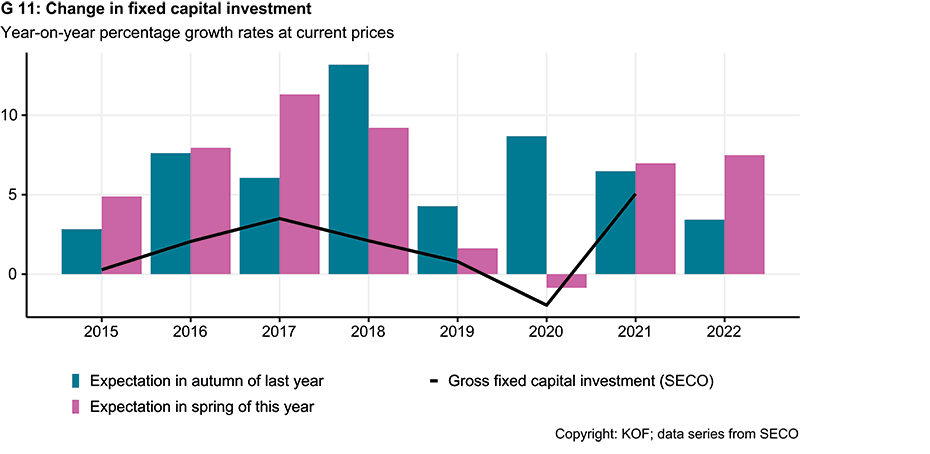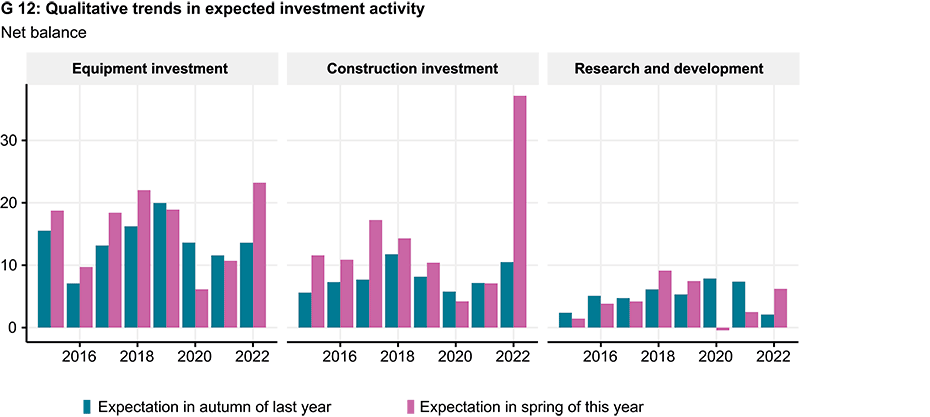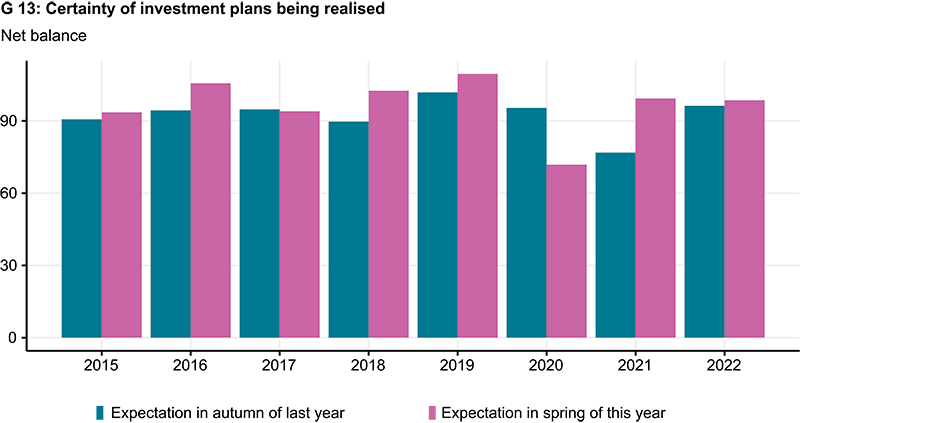Construction projects are boosting Swiss companies’ investment plans
This year’s investment outlook for Swiss firms has improved this spring compared with the autumn of last year. The results of the semi-annual KOF Investment Survey show that companies plan to increase their fixed capital investment by a nominal 7.5 per cent in 2022. These additional funds will primarily be allocated to construction projects. At the same time, environmental protection continues to gain in importance as an investment motive.

Swiss companies have increased their planned investment for the current year. This is shown by the results of the KOF Investment Survey of spring 2022, which reveal that the survey respondents expect to raise their fixed capital formation by 7.5 per cent in nominal terms in 2022 (see Chart G 11). The previous survey, conducted in autumn 2021, suggested that companies were expecting to see nominal growth of 3.4 per cent in 2022. This means that, compared with previous surveys, firms are very confident about their investment plans. The investment growth expected in spring for the current year has averaged 4.8 per cent over the last ten years.
The increases planned since the autumn are primarily due to the higher investment forecasts in the service sector, where the growth expected for 2022 has risen from a nominal 2.4 per cent (autumn 2021) to a nominal 7.7 per cent (spring 2022). Firms in the retail (up 23 per cent) and wholesale (up 10 per cent) sectors expect to see a particularly strong boost in investment for 2022 compared with last year. In contrast, the contributions from the other sectors have hardly changed since the survey conducted in autumn 2021. The manufacturing sector expects to see investment growth of around 8 per cent for the current year, while companies from the construction sector plan to reduce their investment by around 8 per cent.
This planned capital expenditure is increasingly to be allocated to new buildings and conversions of corporate and commercial buildings (see Chart G 12). The proportion of firms whose construction investment is set to grow in the current year has risen from 31 per cent in autumn 2021 to 51 per cent in spring 2022. Conversely, only 14 per cent of respondents intend to reduce their construction investment this year (compared with 20 per cent in the previous survey conducted in autumn 2021). Accordingly, the importance of construction investment has risen on balance to 37 points. The proportion of companies that plan to invest in equipment and machinery as well as in research and development this year has also grown on balance.
Environmental protection becoming increasingly important as an investment motive
More than 90 per cent of the firms surveyed are using their investment to replace existing fixed assets. At the same time, investment in environmental protection and in compliance with trade law requirements has become much more important. This type of investing represents the third most important investment motive for the first time since this survey was initially launched. About 60 per cent of service companies say that they intend to invest in environmental protection this year. In manufacturing the corresponding figure is 56 per cent and in construction it is 38 per cent of the firms surveyed.
In addition, more companies than before are planning to invest in expanding their production or service provision. 73 per cent of companies say that they intend to invest in expansion during the current year, which is a new high compared with previous surveys. The corresponding figure was 69 per cent in the survey conducted in autumn 2021. Expansion investment increases the capital stock and, therefore, production capacity, which is why it can be interpreted as an indicator of companies’ growth expectations. Firms invest in expanding their facilities above all when they expect demand to rise. The larger proportion of companies that plan to make expansion investments thus indicates positive demand stimulus.
Investment-inhibiting uncertainty declining slightly
This positive demand stimulus is also reflected in companies’ confidence that they will realise their investment plans during the current year, which on balance has increased slightly compared with their assessments in autumn 2021 (see Chart G 13). In spring 2022, around 93 per cent of firms rated their investment plans for 2022 as being either certain or very certain (compared with 91 per cent in autumn 2021 for the following year). Conversely, the proportion of companies that consider their investment plans for 2022 to be either uncertain or very uncertain has fallen from 9 per cent in autumn 2021 to 7 per cent in spring 2022. This means that investment-inhibiting uncertainty has decreased slightly overall. This is noteworthy to the extent that the current geopolitical situation – with Russia’s invasion of Ukraine – will have given rise to greater uncertainty.
The performance of the economy is strongly influenced by firms’ investment activity. The KOF Swiss Economic Institute at ETH Zurich therefore conducts a survey of domestic companies every spring and autumn. The semi-annual survey for spring 2022 was conducted from 1 March to 16 May 2022. 6,081 firms were contacted and 2,444 responded as part of this survey, which equates to a response rate of 40 per cent.
Contact
KOF FB Konjunkturumfragen
Leonhardstrasse 21
8092
Zürich
Switzerland



